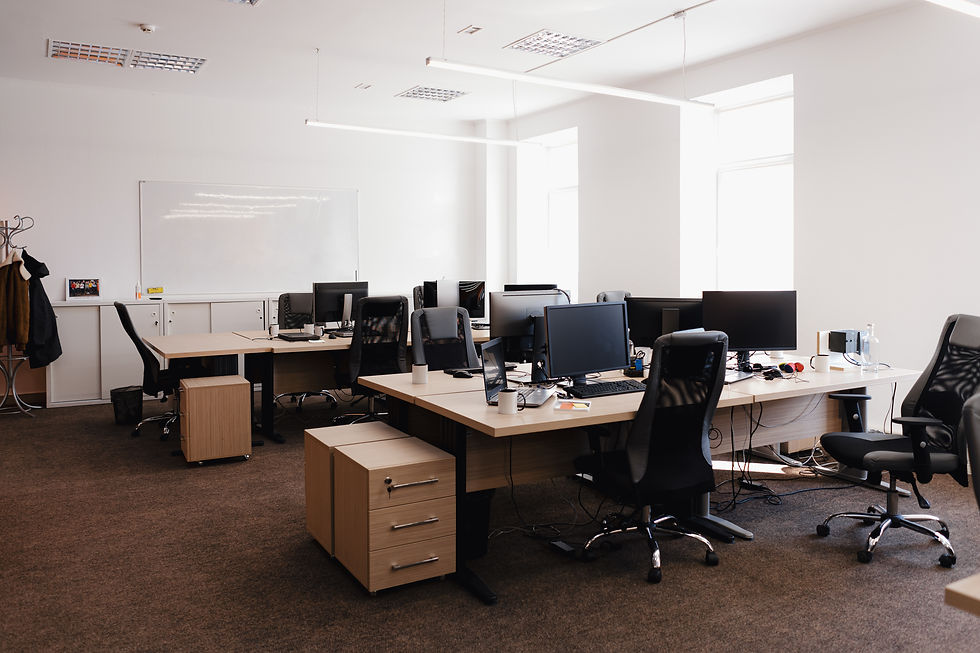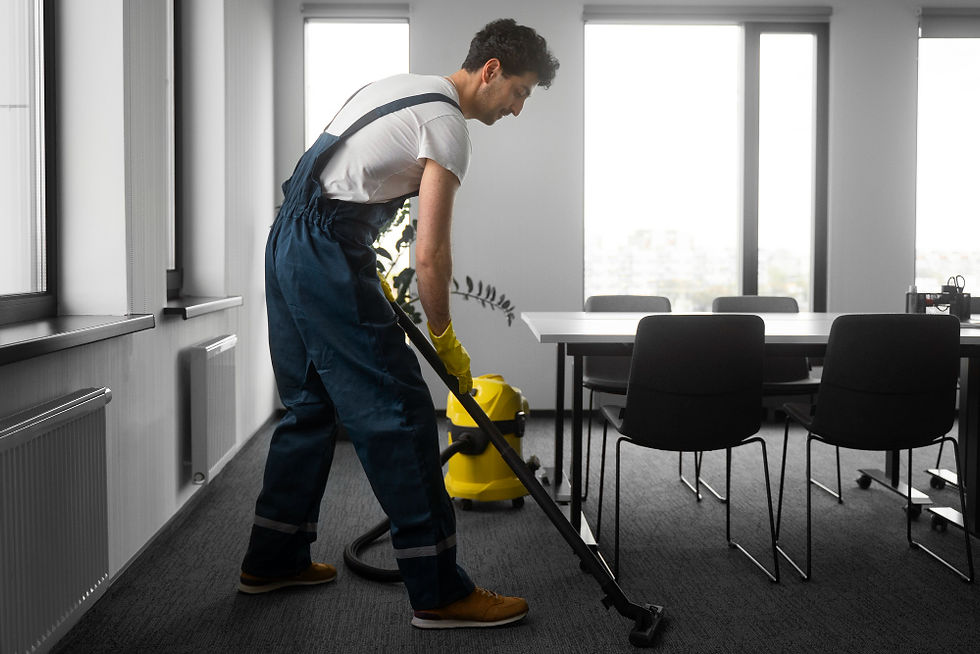How a Clean Office Impacts Employee Health & Productivity
- Kevin Sibille
- Jul 21, 2025
- 4 min read

A clean office is more than just a nice-looking workspace—it’s a key factor in employee health, productivity, and overall business success. In today’s fast-paced work environments, keeping your office clean isn’t just about appearances. It directly influences how your team feels, performs, and stays healthy.
Whether you're managing a large corporate space or a small business office, having a proper office cleaning checklist can make all the difference. Let’s explore how cleanliness affects your employees—and why investing in a clean environment is a smart move.
Cleanliness and Employee Health Go Hand in Hand
Fewer Germs, Fewer Sick Days
An unclean office is a breeding ground for bacteria and viruses, especially in shared spaces like kitchens, restrooms, and meeting rooms. Germs can linger on surfaces like doorknobs, keyboards, and desks for hours—or even days.
When these surfaces aren’t cleaned regularly, employees are more likely to catch colds, flu, or other infections. This leads to more sick days, disrupted workflows, and lower team morale.
Key Takeaway: Regular sanitization of high-touch areas helps reduce the spread of illness, leading to fewer absences and healthier teams.
Better Indoor Air Quality
Dust, mold, and airborne particles can cause respiratory problems and trigger allergies. Dirty air filters, carpets, and poorly ventilated spaces worsen air quality—making it hard for employees to breathe freely and concentrate.
Cleaning air vents, vacuuming carpets, and using air purifiers help improve indoor air quality significantly.
Key Takeaway: Clean air leads to fewer headaches, less fatigue, and a more energized workforce.
Supports Mental Well-being
A cluttered, dusty workspace isn’t just physically uncomfortable—it’s mentally draining. Research shows that messy environments increase stress and decrease focus.
On the other hand, walking into a clean, organized office can instantly lift your mood. Employees feel more calm, focused, and motivated in a tidy space.
Key Takeaway: A clean office can help reduce stress levels and improve overall employee satisfaction.
Productivity Thrives in a Clean Environment
Boosts Focus and Efficiency
When employees aren’t distracted by mess or worrying about dirty restrooms and smelly trash bins, they can focus better on their tasks. A clean desk and workspace support a clutter-free mind.
Also, organized common areas help everyone find what they need faster—no more time wasted searching for a stapler or printer paper.
Key Takeaway: Cleanliness leads to sharper focus and better time management.
Enhances Morale and Motivation
Clean offices send a message: "We care about our people." When employees feel valued, they’re more likely to bring their best selves to work.
A clean, well-maintained space also encourages team pride. Employees are more likely to take ownership of their surroundings and maintain order.
Key Takeaway: Clean environments create positive energy and inspire higher work performance.
Minimizes Disruptions
Nobody wants to work with overflowing bins, dusty monitors, or coffee stains on the table. A dirty environment leads to discomfort and distractions—making it harder to stay on track.
Simple things like regularly emptying trash, cleaning breakrooms, and wiping surfaces can make a huge difference in everyday productivity.
Key Takeaway: A well-cleaned office reduces interruptions and boosts daily workflow.
Simple Tips to Keep Your Office Clean Every Day
You don’t need a full-time cleaning crew to maintain a healthy office—just a little planning and consistency. Here’s how to get started:
Use a Cleaning Checklist
Create a simple office cleaning checklist with daily, weekly, and monthly tasks. Include things like:
Wiping down desks and electronics
Emptying bins
Cleaning restrooms and breakrooms
Vacuuming carpets
Dusting windows and blinds
This helps make sure nothing gets missed and sets a standard everyone can follow.
Provide Cleaning Supplies
Place sanitizers, wipes, tissues, and trash bins in easy-to-access locations. Encourage employees to wipe down their desks, phones, and keyboards at the end of the day.
When cleaning tools are visible and available, people are more likely to use them.
Keep Air Quality in Check
Change air filters regularly and make sure your HVAC system is serviced on time. Add a few indoor plants to purify the air and improve the vibe.
Hire a Professional Cleaning Service
Sometimes, it’s best to leave it to the pros. Professional office cleaning services ensure every corner gets the attention it deserves—especially high-traffic and high-touch areas.
Even a weekly deep clean can make a huge difference in hygiene and employee satisfaction.
Make Cleanliness Everyone’s Responsibility
Clean offices don’t happen by accident—they’re the result of a shared effort. Here’s how to make it a team habit:
Promote a Clean Desk Policy – Encourage employees to tidy up before leaving each day.
Assign Zones – For small teams, assign individuals to monitor certain areas.
Educate Your Team – Share tips and quick reminders about cleanliness in meetings or on noticeboards.
Celebrate Clean Habits – Recognize and reward cleanliness champions in your team.
Conclusion
A clean office isn't just nice to look at—it's a powerful contributor to employee health, productivity, and happiness. From reducing sick days to boosting morale, the benefits of a tidy workspace are impossible to ignore.
If you haven’t already, start by building a basic office cleaning checklist and making cleanliness a team priority. You’ll be surprised how quickly small actions can create a big impact on your team’s performance and well-being.



Great insights—clean and organized workspaces truly play a major role in boosting employee well-being and performance. In fast-paced industries, where staffing needs can change quickly, it's also important to maintain healthy environments for both full-time and temporary staff. Agencies like Patron Career Staffing understand the value of workplace safety and cleanliness when matching talent with employers. A healthy team is a productive team—thanks for highlighting this important topic.